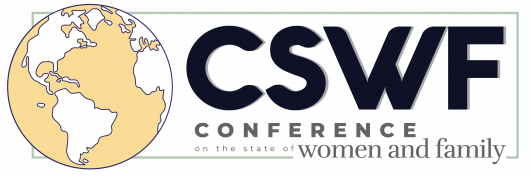
Exporting Western Ideology Instead of Solving Poverty: the ACP-EU Partnership Agreement
Concept Note for the NGO Committee on the Family, NY
Date: 12:00 – 1:15 pm, March 14, 2024, Thursday
Title: “Exporting Western Ideology Instead of Solving Poverty: the ACP-EU Partnership Agreement”
NGO: Christian Council International - https://www.christiancouncilinternational.org/
Venue: Both virtual and on site, at https://www.cswfamily.org/
Background on the Event
Western Ideology Export instead of Solving Poverty
In recent years mainly Western member states of the United Nations (UN) have been focused on promoting progressive ideologies to developing countries instead of focusing on poverty issues. International organizations as the European Union (EU) and the UN and their initiating and implementing institutions and agencies are not seldom used to channel Western individualism to the developing world.
A concrete example: ACP-EU Treaty
A recent concrete example of this is the inclusion of controversial provisions in the Partnership Agreement between a group of 79 African, Caribbean and Pacific (ACP) countries and the European Union (EU). This so-called ACP-EU Partnership Agreement is a 20 year binding treaty is now signed by about 60 ACP countries, several times under pressure of the EU and without proper awareness of the consequences by people and capitals, who have often opposite and pro-life- and family legislation.
The Treaty intrudes into almost every area of public and private life of the EU and ACP countries. From dictating abortion, to comprehensive sexuality education (CSE), to parental discipline, and social, sexual, gender and cultural norms and more, this treaty goes far beyond a normal trade treaty, violating national sovereignty and bringing danger to especially women and girls, instead of addressing the urgent need of solving the pervasive poverty in the developing world.
In concreto it means the following:
1. Elevates soft law documents (ICPD, Beijing, etc.) to the status of treaty obligations and makes African governments accountable to the EU for their implementation.
2. Obligates ACP governments to “uphold international norms and agreements” without specifying which norms or agreements. This leaves quite some room for loose interpretations.
3. Binds ACP governments to implement all of the controversial review conference outcome documents of ICPD and Beijing (ICPD Nairobi Summit, Beijing Generation Equality Forums, etc.).
4. Obligates ACP governments to “cooperate with the UN‟s human rights bodies and mechanisms [i.e., UN committees, Independent Expert on Sexual Orientation and Gender Identity - SOGI] and fully support the controversial work of the UN Human Rights Council‟. These bodies and mechanisms engage in all kinds of reinterpretations and promote abortion, sexual rights, and autonomous sexual rights for children, and calls for all sorts of things without parental consent. It requires governments to fully support the controversial work of the UN Human Rights Council.
5. Obligates ACP governments “to coordinate positions” and “voting” in “international and regional organizations and forums”. It is highly problematic to see how all these different governments with all these different opinions on social and SRHR issues can come together with the same voting positions in the UN and regional institutions.
6. Requires ACP governments to provide universal access to “comprehensive sexual and reproductive health information and education”. This is the new euphemism used by the UN and other international organizations for Comprehensive Sexuality Education (CSE) in accordance with the UN‟s controversial technical guidance on sexuality education.
Women and girls especially in danger
Women and girls are the first ones in danger of suffering from this treaty because of the deceptive requirements of legalization of abortion, prostitution, same-sex marriage, the LGBT agenda, of which transgenderism is especially dangerous to women and girls, and child sexualization through its requirements to implement multiple innocuous-sounding documents and sexual and reproductive health and rights, and guided by the UNESCO International Guidance on Sexuality Education.
Program
Key Issues Discussed and Recommendations for Action:
The impact for countries which signed, and for those which refused to sign the ACP-EU agreement and what they can do to protect their nation’s children, parental rights, family and cultural values, and especially national sovereignty.
What can be done to raise awareness to people in developing countries and among their representatives on these incessant efforts of the export and imposition of Western ideologies.
How can we depoliticize institutions and agencies of international organizations and make them working as servants of all the member states instead of being agents for Western style change of culture and sexual rights etc.
Legal analysis on how to understand current phrases and terms that are being used to implement liberal ideologies and how to change them for pro-family and consensual and international agreed language.
Universal Declaration of Human rights highlighted from a philosophical standpoint.
Moderator: Henk Jan van Schothorst (Netherlands), Executive Director Christian Council International
Proposed speakers (TBD):
Keynote Speaker – Sharon Slater, USA, President of Family Watch International
Speaker 2 – Sonnie Ekwowusi, Nigeria, Chairman Human and Constitutional Rights Committee of the African Bar Association (AFBA) (virtual)
Speaker 3 – Seyoum Antonios, Ethiopia, Africa Director Family Watch International
Speaker 4 – Richard Kakeeto, Kenya, Africa Policy Advisor at Family Watch International (virtual)
Speaker 5 – Weronika Przebierała, Poland, Director International Law Center, Ordo Iuris Institute
Speaker 6 – Theodore Madrid, USA, Legal Expert at Hillsdale College
Speaker 7 – ?
Time:
Keynote Speaker 10 minutes, other speakers 5 minutes, so totally 40 minutes
Q&A – 30 minutes, Closing remarks: 5 minutes, Total time: 1hr 15min